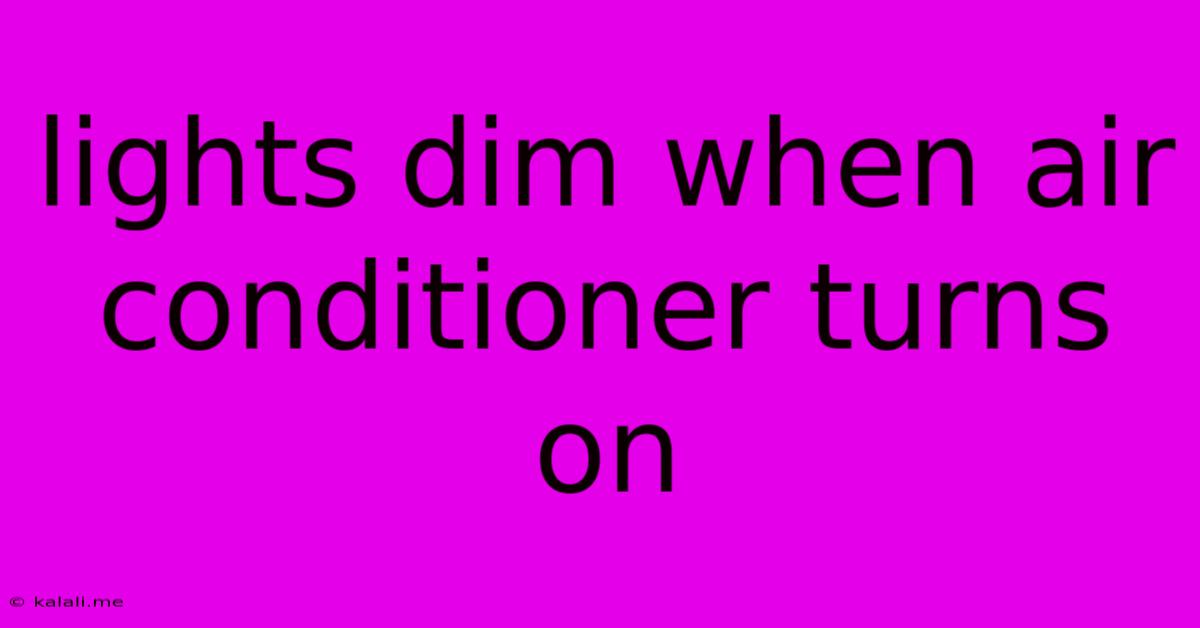Lights Dim When Air Conditioner Turns On
Kalali
May 31, 2025 · 4 min read

Table of Contents
Lights Dim When Air Conditioner Turns On: Troubleshooting and Solutions
Are your lights dimming every time your air conditioner kicks on? This isn't just an annoying flicker; it's a sign that your electrical system might be struggling to handle the surge of power your AC unit demands. This article explores the common causes behind this issue and provides practical solutions to resolve it. Understanding the underlying problem is key to preventing potential electrical hazards and ensuring your home's electrical system operates efficiently.
Why Do My Lights Dim When the AC Turns On?
The most common reason your lights dim when the air conditioner starts is a voltage drop. When your AC unit, which is a high-power appliance, turns on, it draws a significant amount of current from your electrical system. If your wiring, electrical panel, or service entrance is inadequate for the combined load of your AC and other appliances, the voltage drops, resulting in dimmed lights and potentially other electrical issues. Think of it like a water pipe – a sudden high demand can cause a temporary pressure drop.
Here are some specific culprits:
- Insufficient Wiring: Old or thin gauge wiring might not be able to handle the high amperage draw of the air conditioner. This is particularly problematic in older homes.
- Overloaded Circuit: Your air conditioner may be on the same circuit as numerous other appliances or lights. This overload causes the circuit breaker to struggle, resulting in the voltage drop.
- Loose Connections: Loose connections in your wiring or at the electrical panel can create resistance, leading to voltage loss and dimming lights.
- Faulty Electrical Panel: An outdated or damaged electrical panel might not be capable of distributing power efficiently, especially under heavy loads.
- Low Voltage at the Service Entrance: In some cases, the problem might lie with the power supply itself. This is less common but can be identified by a qualified electrician.
- Starting Capacitor Issues (AC Unit): The starting capacitor in your air conditioner helps the compressor start. A failing capacitor might cause a large inrush current, leading to a more pronounced voltage drop. This is often accompanied by other AC issues.
Troubleshooting Steps:
- Check Your Circuit Breaker: Is the circuit breaker for your air conditioner tripping or close to tripping? This indicates an overloaded circuit.
- Identify Shared Circuits: Determine which other appliances or lights share the same circuit as your air conditioner. Unplug unnecessary items to reduce the load.
- Observe the Dimming: Note the severity and duration of the dimming. A brief, subtle dimming might be less serious than a prolonged, significant drop in brightness.
- Check for Loose Connections: If you have some electrical experience, carefully inspect your wiring for loose or damaged connections. However, if you're not comfortable working with electricity, call a qualified electrician.
- Inspect the Air Conditioner: While less common, examine your air conditioner's components, particularly the starting capacitor. Look for any signs of damage or overheating.
Solutions:
- Dedicated Circuit: The most effective solution is to install a dedicated circuit for your air conditioner. This prevents overloading and ensures the AC has sufficient power. A qualified electrician should handle this task.
- Upgrade Wiring: If your home has old wiring, upgrading to thicker gauge wiring can significantly improve its capacity to handle higher amperage loads. This is a more involved undertaking and should be performed by a professional.
- Replace the Electrical Panel: A worn-out or inadequate electrical panel needs to be replaced. This is a substantial project best left to a qualified electrician.
- Repair or Replace the Starting Capacitor (AC Unit): If a failing starting capacitor is the culprit, replacing it might resolve the issue. However, this is a job for a qualified HVAC technician.
When to Call a Professional:
If you're uncomfortable troubleshooting electrical problems yourself, always contact a qualified electrician. Working with electricity can be dangerous, and a professional can safely diagnose and fix the underlying issue. Similarly, HVAC issues should be addressed by a qualified technician. Ignoring the problem could lead to more severe electrical problems or damage to your air conditioning system. Don't risk it – call a professional for peace of mind and safety.
Latest Posts
Latest Posts
-
How To Move Door Strike Plate
Jun 02, 2025
-
How To Get Playdough Out Of A Rug
Jun 02, 2025
-
Repair Hole Of Recessed Light Socket
Jun 02, 2025
-
What Does Lp Stand For In Music
Jun 02, 2025
-
Jingle Bells Batman Smells Robin Laid An Egg
Jun 02, 2025
Related Post
Thank you for visiting our website which covers about Lights Dim When Air Conditioner Turns On . We hope the information provided has been useful to you. Feel free to contact us if you have any questions or need further assistance. See you next time and don't miss to bookmark.